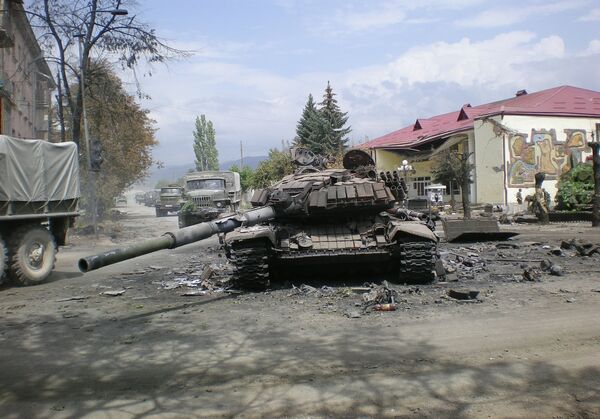Three years have passed since Georgia attacked on South Ossetia on August 8, 2008, and it has become clear in the time since that the war was a point of departure for Russia's new foreign policy. Russia demonstrated its ability to defend its vital interests by force, if necessary. Washington responded by dialing down its confrontation with Moscow in the post-Soviet space and entering into a dialogue with Russia as equals for the first time since the collapse of the Soviet Union.
The five-day war was a serious test for Russia's political leadership. For the first time in its recent history, Russia had to use military force outside its borders. By launching a military operation to "enforce peace," the Kremlin disregarded the wishes of the West, primarily Georgia's patron the United States. As a result, Russian-U.S. relations soured to an extent not seen since the Cold War.
However, it's fair to say that the bilateral "reset" launched in 2009 was a direct consequence of the events in South Ossetia.
Last gasp
Three years give us enough perspective to answer at least some basic questions about the war in South Ossetia. No doubt, South Ossetia was the last gasp of the U.S. policy of "forechecking", which Washington had pursued in the former Soviet Union since the early 1990s. The United States took a serious gamble by making Georgia its key ally in the Caucasus.
In retrospect, Georgia could very well have become a vehicle of U.S. influence, helping it project its military might in the Black Sea and the Caspian Sea. It could have also become a foothold of sorts for monitoring events in Russia's North Caucasus.
A number of Russian and foreign experts have repeatedly criticized this policy as pointless. However, given that Russian-U.S. competition in the post-Soviet space did not cease for a minute since the 1990s, this was a well-thought-out and pragmatic policy. It guaranteed the United States control over an important oil route (the Baku-Tbilisi-Ceyhan oil pipeline), created many opportunities for power plays in the oil-and-gas-rich Caspian Sea region, and opened a northern channel for a potential military operation against Iran.
Logic of confrontation
Needless to say, there is no direct evidence that Washington ordered the attack on South Ossetia. However, there are some signs that it was not Tbilisi but the anti-Russian neo-cons in the George W. Bush administration that orchestrated the August war.
First, the logic behind the Russian-U.S. confrontation initiated by officials in the Bush administration had been leading to this point. By the end of the 2000s, Moscow managed to halt the triumphal procession of color revolutions and even regained some of its positions in the post-Soviet space. One could see the war in South Ossetia as Washington attempting to show Moscow who was in the driver's seat in the former Soviet republics.
Moreover, a swift defeat of South Ossetia, a republic that was under Russia's wing despite ostensibly belonging to Georgia, would have damaged Moscow's reputation beyond repair and created new opportunities for the United States. After all, who needs a weak ally? It is always better to side with a country that can take action.
Clearly, if Moscow had shown indifference to South Ossetia's fate, the federal government's authority in the North Caucasus would have been severely damaged. Given the mentality of North Caucasian elites, there is reason to assume that surrendering South Ossetia would have likely caused a serious crisis in the region and called into question Russia's territorial integrity.
Finally, Georgia's attack on South Ossetia was a great opportunity for the U.S. to test Moscow's combat capabilities and determine the condition of its armed forces, while at the same time gauging the effectiveness of the Georgian army. Washington needed to know whether Tbilisi was ready to be its regional military ally, especially given the possibility of a military operation against Iran.
What next?
The timing of the August 8 operation was perfect, but many other important factors were neglected. For example, there was the fact that the well-equipped Georgian army had no combat experience; rumors of the Russian military's death had been greatly exaggerated; and the proximity of the theater of war to Russia's border.
The authors of this war were no doubt surprised to discover Moscow's great political will and unexpected readiness to see the conflict through.
As a result, the attack on South Ossetia achieved the opposite of what it was meant to - a U.S. ally failed to consolidate its position, whereas Russia greatly increased its international clout and convincingly nullified all U.S. security guarantees.
However, after getting off to a great start, Moscow adopted a passive approach toward Georgia after the end of hostilities and its recognition of Abkhazia and South Ossetia as independent states. It goes without saying that reconciliation is impossible with the current Georgian political leadership, but this does not justify Russia's lack of a clear strategy toward the Saakashvili regime. As long as this dangerous adventurist, susceptible to foreign influence, remains in power, tensions in the region will not subside.
It is also necessary to put on a practical plane the issue of the legal responsibility of the Georgian president and his entourage for the war crimes in South Ossetia. Judging by everything, Russia's political leaders, particularly President Dmitry Medvedev, are ready to move in this direction.
The views expressed in this article are the author's and may not necessarily represent those of RIA Novosti.

